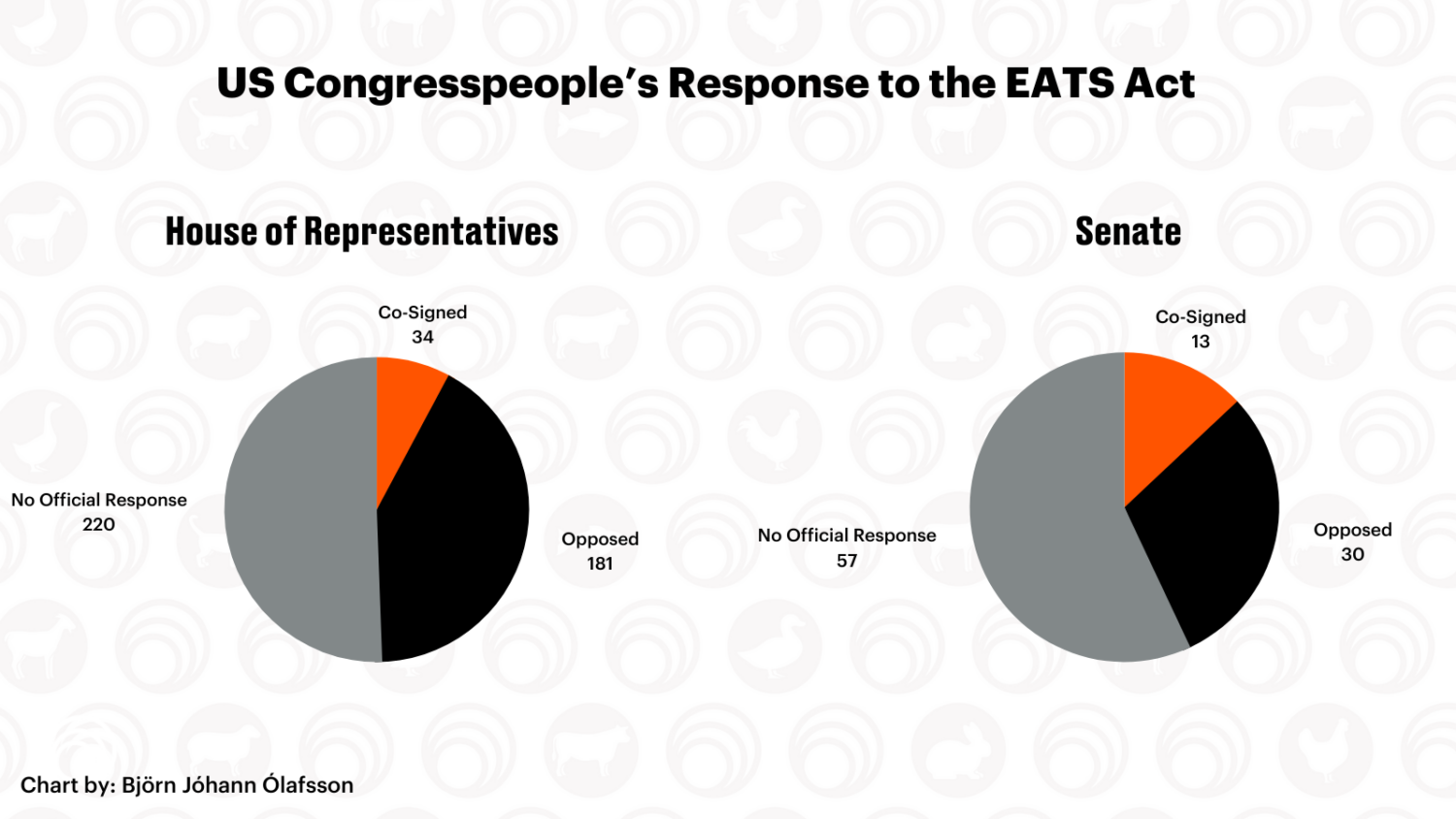Solutions
When Marine Parks Close, Whales and Dolphins Face Uncertain Future
Entertainment•7 min read
Reported
Three charts document the lawmakers taking a position on the controversial EATS Act, and the votes still up for grabs.


Words by Björn Ólafsson
The federal bill that would gut states’ rights to regulate the way animals are farmed for meat, is facing strong opposition.
Update: as of October 15th, 3 more House Republicans have co-signed the bill and 16 House Republicans have opposed the bill in a public letter citing states’ rights, fair competition and national sovereignty. Of those opposed, 12 had not previously indicated disapproval, bringing the total number of House co-signers to 34 and opponents to 181.
In September, 171 U.S. Representatives and delegates and 30 Senators signed a letter opposing the EATS Act, arguing that it is “particularly draconian” and would override countless laws, harm states’ rights and threaten American family farms.
The EATS Act, short for Ending Agriculture Trade Suppression Act, is a federal bill that would prevent states from regulating agricultural products. It is broadly believed to be a response to the Supreme Court in National Pork Producers Council v. Ross, which upheld California’s Prop 12 — the 2018 democratic ballot initiative that increased the confinement space of many farmed pigs, cows and chickens.
Now, a total of 211 politicians join the growing ranks of lawyers, academics, activists and lawmakers who have expressed disapproval of the controversial legislation.
A list of 181 Representatives signed a letter in September opposing the EATS act — 163 Democrats, 5 Republicans and two Democratic delegates from Washington D.C. and the Northern Mariana Islands.
The five Republican lawmakers who signed the letter are Mike Garcia (CA-27), Chris Smith (NJ-4), Mike Lawler (NY-17), Lori Chavez-DeRemer (OR-5) and Brian Fitzpatrick (PA-01).

Collectively, the group of politicians represents 127,053,490 Americans, or around 38 percent of the population. This is the strongest confirmed opposition to the controversial bill thus far. The bill will need over 218 votes in the House and 51 in the Senate, although it may potentially need more to overcome a filibuster.
Meanwhile, the EATS Act in the House is currently co-signed by 34 Representatives, all Republicans.
In the Senate, another opposition letter was signed on August 19th by 30 Senators, including one Republican (Susan Collins-Maine) and two Independents (Bernie Sanders-Vermont and Angus King-Maine). The EATS Act is currently co-signed by 13 Senators, all Republicans.
The Senate letter raised similar points — that the EATS Act would undermine the voters’ will, states’ rights and many existing laws in both red states and blue.
The bill is supported by the industrial meat and dairy industries, notably the National Cattlemen’s Beef Association and the National Pork Council. Eleven governors, all Republican, also support the bill, although they do not have voting power.
The bill was introduced into the Senate on June 15th and the House on June 30th. There are currently 13 co-sponsors of the bill in the Senate. So far, no official vote has been made. And, while its fate is far from determined, this latest opposition casts doubt on its long-term viability.
In a joint statement in June, the sponsors of the bill argue that it will benefit the economies of farming states like Iowa, Texas and Arkansas. “Congress shouldn’t allow any one state to single-handedly upend the country’s agricultural economy and force the American people to bear the burden of higher food prices,” says Senator Deb Fischer (R-Nebraska).
The announcement included several statements from meat industry executives, including the National Cattlemen’s Beef Association and the National Pork Producers Council — both organizations known for their lobbying.
However, farmed animal advocates argue the EATS Act would allow for the expansion of cruel and unethical farming practices — like farrowing and gestation crates, which box in pregnant pigs such that they cannot stand or turn around.
But animal advocates are far from the only critics — many legal scholars argue the bill is unconstitutional. A legislative analysis from Harvard argues the EATS Act “defies basic notions of federalism and would circumvent decades of settled constitutional jurisprudence.” The report goes on to say that the bill defies the Tenth Amendment, Eleventh Amendment, the Commerce Clause and several settled Supreme Court decisions.
Critics also point out the language of the bill, which is characterized as vague and far-reaching. Harvard Animal Law Chair Chris Green says the bill’s language is far too broad: “you've got three really key terms [that are] completely undefined. And then you have the fourth really key term defined so broadly as to include everything under the sun.”
Because the language of the EATS Act is vague and sprawling, many laws regarding food, animals and health are at stake here. The Harvard analysis finds about one thousand state and local laws at risk from the proposed bill, although they acknowledge that number is almost certainly an undercount.
The House Representatives agree, writing that the EATS Act could potentially infringe on “measures to protect against invasive pests, prevent infectious diseases, improve food safety, address agricultural concerns such as seed standards, and promote animal welfare and consumer protection regarding puppy mills and pet food.”
Many family farmers also oppose the bill. A letter from 38 farming and ranching groups argues that the law would harm small farmers and only benefit large mega-corporations.
The policies that would be struck down by the EATS Act are popular with voters — California’s law preventing gestation crates passed with a 63 percent “Yes” vote and a similar bill in Massachusetts passed with 78 percent of its citizens affirming the law.
This piece has been updated.